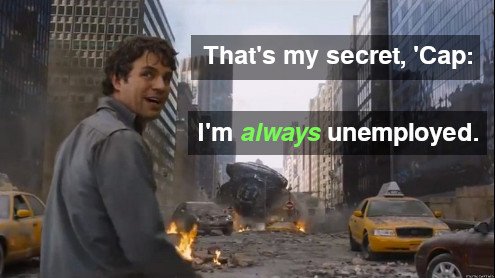Becoming immune to your biggest fear
One common theme and certainly a recurring question I get asked all the time given my career time working in Sports events is: "where are you going next?"
It's a fair question to get asked. After all, consistently changing organizations every two to three years it's probably not something that most people with steady jobs get to experience. But if you dig just a little deeper into this question, there's an air of fear - maybe even jealous malice - hidden behind the naïve curiosity of the asker. That air is the unconscious, but biggest fear that a working person today can have - yet, one that I managed to overcome consistently over the last decade of my life.
Before I spill the beans on what that fear actually is, though, let's do a little preparation exercise. Think about some things you routinely fear that may happen in your daily life and try to rank them roughly in how probable it is that they will happen, and much priority you give to avoiding them as a result. For example:
Getting run over by a car crossing the street? Some roads can be tough for pedestrians or cyclists. Waiting for the red light isn't too expensive in terms of time.
Falling down the stairs and getting injured? Holding on to the handrails and going steady will save you a lot of (literal) headache and fees later in exchange for a few "lost" seconds of time.
Burglars robbing your house when you're out? Installing a good lock can vary in price, but good relations with your neighbors can come for free.
Getting your computer, phone or online accounts hacked? Updating your software to the latest version usually doesn't cost you much, and getting to know and follow a few online security best practices like a password manager is free of cost.
You get the point. There are risks, there are impacts and there are mitigation strategies you can apply. No need for me to spell out the whole risk management ABCs on it. But these are "mild" risks I pointed out, and they are still connected underneath by one central theme. It's the same theme that you implicitly keep thinking about day in and out whether your like it or not.
That theme is money. Specifically, your personal finances.
You don't want to get injured, even lightly, because of the costs it will require to recover from it (both in money and time out). You don't want your property that you paid so much of your dear money for to be taken away from you. And who knows what can someone do after breaking into your online life - could they extort you of your money by keeping your reputation as a hostage?
Even then, you usually think about these themes under yet another assumption: that the money will always keep coming. That's right: you'll always have your salary coming in at the end of the month... right?
But what if you don't?
That's when the whole foundation of most people's lives comes crashing down.
That's when most people panic. That's when they finally become interested in checking their bank accounts to see how much further can they live in the future - and then panic again.
And that is the ultimate fear of the working person nowadays: losing their job.

If you have worked any sort of corporate job, you have felt this fear before at some point:
- When the HR rep calls you in private in their offices one afternoon.
- When senior management sends emails about "tough times" or "downsizing."
- When your boss calls you or hovers over too much around you for comfort.
- In a job interview, wondering if you will actually get that job.
Deep inside that money question keeps ringing within your ears throughout those situations. And yes, you can tone it down - but you just can't mute it.
"What if this happens... what if I get fired... will I be the next?"

Not me, though.
Like a preventive vaccine treatment taken over the years, I am now immune to that fear. What just five years ago would have had a catastrophic, paralyzing influence over me and my decision-making nowadays just floats around as a minimal, perhaps even funny afterthought. A sort of "imagine that, eh" experience.
How did I do that? How did I take the average modern-day city-dweller's ultimate fear and shoved it into a wastebasket - trashing it completely with all the real-life risks it carries? The answer is simple: I got into a position of power.
The names may be similar, but the concept is always the same: a position of power is a situation where you can disregard external threats by having in your possession something to neutralize them. This is probably best described by this post in Mr Money Mustache's blog, where he outlines how by positioning yourself in a way you can counter your life's threats, you do not let those threats control you back.
So, what's the biggest threat to your modern-day life right now? Lack of money. And how do you neutralize it?
Whereas most people would now answer this as "getting enough money," this is short-sighted. Money is expendable; use it once and it's gone. If you amass "enough money" today, tomorrow that's no longer enough since you've spent some of it to live past the day. The only way to ensure you'll always have enough money is to have a source of money that never ends.
Still thinking about your salary at the end of the month?
Guess what: that comes from a job. A job that you may or not like - just as well as it may or may not like you back one day. And as long as you depend on it, it will always have control over you.
Which brings me back to the topic of my career, and how people ask me what's next. When you live this life of events, things roll around, linger, change, and everything in between happens. Yet, there's always one certainty: that one day, after the end of the event, you will be fired. And in much of the spirit of fear treatment therapy, I've got so much exposure to being unemployed over the last decade that I simply learned not to fear it anymore.
In fact, I turned to consider myself unemployed by default, unless a job comes by.

Ok, that's the psychological part. But how about those very real consequences of being without an income for long periods of time? Depending on the situation, you can be up to 6 months without a new event.
This is where the position of power has my back: nowadays, I don't need an income anymore to survive. I've built myself a financial position through investments and solid planning that provides me enough passive income to pass any amount of time without a job and salary. That's "enough money" that lasts forever - with or without a job. I can stay afloat in the water endlessly without having to swim. Fear gone.
Of course, a simple description of what has to be done is infinitely easier than actually doing it, but remember: if you don't have a map of where you're going, how do you find out where you need to go? So if you are to follow similar steps to me, start planning your financial life now. Not tomorrow, right now. Drop what you're doing, get some pen and paper and jot down how your finances are looking right now. For example:
- How much money do you have in the bank?
- How much money is left from your salary after your living expenses?
- Any debts or unnecessary fees leaking out your money?
- How much money do you make outside of your salary?
Now comes the question of what needs to be done next. Depending on how "far down" the road are you, your homework may be less intensive, or more. But these specifcs are more suitable for another post in another blog.
So when people curiously (or perhaps maliciously) ask me what I'm going to do next, my answer is always this: take a break. Delivering an event is a tough job, not to mention the Olympics. I don't deserve a break - I need one, like, physiologically. And I can weather the downtime without that so-precious salary.
This is a luxury I've afforded over the years through smart decisions and good financial planning. And if I had to rank the importance of the things I learned over the last decade, this would be the number #1. It earned me my peace of mind from any fear of financial "disasters" and what-ifs.
And it has earned me my complete freedom, too.
Essay originally published August 12th 2024.
Opinions are my own and do not necessarily reflect those of my current or former employers
